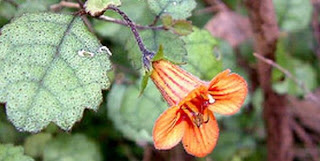KOMPAS.com — Kepunahan burung ternyata bisa memicu kepunahan tanaman berbunga. Mau tahu alasannya? Jadi, beberapa tanaman bunga ternyata sangat bergantung pada burung untuk membantu proses penyerbukannya. Jika burung absen, maka proses pernyerbukan yang mengawali perkembangbiakan terganggu dan akhirnya akan memicu kepunahan.
Fakta tersebut telah dijumpai pada herba Rhabdothamnus solandri yang banyak hidup di wilayah North Island, Selandia Baru. Populasi tanaman herba tersebut menurun drastis sejak hilangnya dua spesies burung dari wilayah itu, yakni Anthornis melanura dan Notiomystis cincta. Dua spesies tersebut punah setelah tikus diintroduksi pada tahun 1870 dan menjadi pemangsanya.
Sebelumnya, ilmuwan dari Universitas Canterbury di Christchurch, Selandia Baru, membandingkan tanaman herba yang ada di North Island dengan tanaman herba di tiga pulau kecil lain, di mana 2 spesies burung tersebut masih dijumpai. Mereka membantu penyerbukan 79 tanaman herba dan membandingkan hasilnya dengan penyerbukan alami.
Ilmuwan menemukan, 70 persen tanaman di North Island dan ketiga pulau lainnya yang penyerbukannya dibantu ilmuwan menghasilkan buah. Tanpa bantuan manusia, hanya 22 persen saja tanaman di North Islands yang menghasilkan buah. sementara di ketiga pulau lainnya, persentase tanaman yang berbuah tanpa bantuan mencapai 58 persen.
Selain itu, peneliti menjumpai bahwa ukuran buah yang dihasilkan oleh tanaman di North Island lebih kecil. Biji yang dihasilkan juga 84 persen lebih sedikit, bukti bahwa tanaman sebelumnya tak terserbuki dengan baik. Jumlah biji yang lebih sedikit tercermin dari ratio populasi tanaman muda dan tua yang tak seimbang.
Dave Kelly, peneliti yang melakukan riset ini mengatakan, manusia masih memiliki kesempatan untuk menyelamatkan Rhabdothamnus solandri dari kepunahan. "Kepunahan tumbuhan berlangsung lebih lambat dari kepunahan hewan, sebab tumbuhan bisa hidup lebih lama. Kita memiliki kesempatan untuk menyelamatkannya," katanya.
Salah satu langkah yang bisa dilakukan, menurut Kelly, adalah mengembalikan populasi dua spesies burung ke wilayah North Island. Dengan demikian penyerbukan yang sempurna bisa berlangsung, membantu kelestarian spesies. Kelly memperkirakan bahwa tanaman herba yang kini berkurang populasinya bisa bertahan hingga 150 tahun.
Sementara itu, pakar burung dari Universitas Queensland di Brisbane, Australia, Martin Maron, mengatakan bahwa kejadian tersebut menggambarkan pentingnya peran burung. "(Kehilangan burung) tidak hanya kehilangan satu spesies dari muka bumi. Kehilangan spesies kunci di area tertentu bisa membuat ekosistem kolaps," katanya.
Bird Extinction Rate Loss Trigger
KOMPAS.com - it could trigger the extinction of bird extinctions flowering plants. Want to know why? So, some flower plants were highly dependent on birds to help the pollination process. If the bird is absent, then the process that started breeding pernyerbukan disrupted and will eventually lead to extinction.
This fact has been observed in many herbaceous Rhabdothamnus solandri who live in the North Island, New Zealand. The herbaceous plant population decreased dramatically since the loss of two species of birds from that region, namely Anthornis melanura and Notiomystis cincta. Two species are extinct after rats introduced in 1870 and become predators.
Previously, scientists from the University of Canterbury in Christchurch, New Zealand, comparing the herbaceous plants in the North Island with herbaceous plants in three other small islands, where 2 species of birds are still found. They pollinate the 79 herbs and compare the results with natural pollination.
Scientists found that 70 percent of crops in the North Island and the three other islands which scientists assisted pollination to produce fruit. Without human assistance, only 22 percent of crops in North Island producing fruit. while the other three islands, the percentage of plants that bear fruit without the aid reached 58 percent.
In addition, researchers found that the size of fruit produced by plants in the North Island is smaller. The resulting seeds are also 84 percent less, evidence that the previous crop was terserbuki well. The amount reflected fewer seeds than the population ratio of young and old plants are not balanced.
In addition, researchers found that the size of fruit produced by plants in the North Island is smaller. The resulting seeds are also 84 percent less, evidence that the previous crop was terserbuki well. The amount reflected fewer seeds than the population ratio of young and old plants are not balanced.
Dave Kelly, the researchers who carried out this research say, humans still have a chance to save Rhabdothamnus solandri from extinction. "The extinction of plants is slower than the extinction of animals, because plants can live longer. We have the opportunity to save him," he said.
One step that can be done, according to Kelly, is to restore the populations of two species of birds to the North Island. Thus perfect pollination can take place, assisting the preservation of species. Kelly estimated that herbs are now reduced the population can survive up to 150 years.
Meanwhile, bird experts from the University of Queensland in Brisbane, Australia, Martin Maron, said the incident illustrates the importance of the role of birds. "(Losing birds) are not only losing one species from the face of the earth. Loss of key species in certain areas could make the ecosystem collapse," he said.
